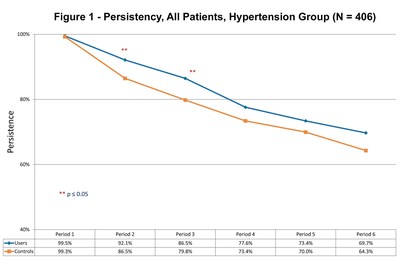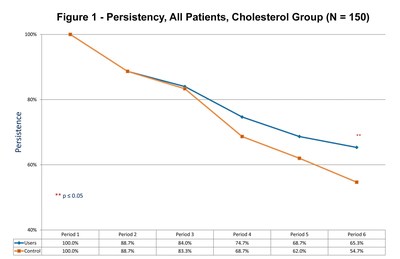Medisafe Presents Results of Six-Month Medication Adherence Improvement Study at ISPOR 2016
Results show Medisafe users with hypertension and hyperlipidemia have significantly higher medication adherence than a matched control group
WASHINGTON, DC — May 25, 2016. Medisafe, the personalized medication management platform with over 2.8 million users, announced today that findings from a scientific study conducted by IMS Health showing Medisafe’s medication adherence benefits will be presented at the International Society for Pharmacoeconomics and Outcomes Research (ISPOR) 21st Annual International Meeting in Washington D.C. The meeting draws more than 2,000 attendees from over 40 countries and is one of the world’s largest conferences for pharmacoeconomic and outcomes research.
The study showed that Medisafe users taking cholesterol and hypertension medication had 19.5% and 8.4% higher relative adherence at six months respectively compared to a control group of non-users. The US Center for Disease Control (CDC) recognizes medication non-adherence for chronic diseases as a serious public health problem, resulting in up to $300 billion of avoidable health care costs in the US annually and amounting to 10% of total US health care costs.
Persistency, All Patients, Hypertension Group (N = 406)
Persistency, All Patients, Cholesterol Group (N = 150)
“This study revealed the promise of mHealth platforms such as Medisafe to increase medication adherence, which has a proven direct link to improved health outcomes, lower hospitalization rates and decreased medical costs,” said Jon Michaeli, Executive Vice President at Medisafe and a contributing author of the research. “Medisafe’s holistic approach of using scheduled reminders, a social support system, biofeedback, and individually personalized tools and resources, help patients sustain high levels of engagement for extended periods of time, which is critically important for chronic disease such as high cholesterol and high blood pressure.”
The study compared Medisafe users entering a dosing schedule in the app for an antihypertensive (AH) or cholesterol-lowering (CL) therapy between October 1, 2014 and December 31, 2014 to matched non-app user controls. Users were matched to controls one to one based on therapy class, age, gender, pay type, geography, and if participants were new to therapy. Both groups’ prescription activity was then followed using patient anonymous prescription claims for AH or CL as identified in the IMS de-identified prescription database. Persistence was calculated at the Hypertension/Lipid market level for six months, with persistence measured using a 10-day refill gap past the end of the days’ supply of the previous prescription. Differences in proportions of patients that remained persistent were tested using chi-square.
The study concludes that broad use of mobile technology supporting medication adherence could lead to better control of chronic diseases and lower costs to the health care system.
The full poster presentation can be viewed on the ISPOR website and the abstract is published in the ISPOR publication Value in Health (Wade RL, Clancy B, Michaeli J). Improvement in antihypertensive and cholesterol-lowering medication persistence using a mobile technology application. Value in Health 2016; 19(3): A306 (abstract PMD53).
Results
There were a total of 406 AH and 150 CL users matched to controls. The mean age of the patients was 52.5 and 54.6 years for AH and CL, respectively. The study groups were approximately equal in male-female ratio. Of AH patients, 7.9% were new to therapy, while 7.3% CL patients were new to therapy. Comparing all users to all controls at 6 months, a 5.4% higher persistence for AH (69.7% vs. 64.3%, p=0.05), and a 10.7% higher persistence for CL (65.3% vs. 54.7%, p=0.03) was observed for app users. Similar results were observed among patients that were not new to therapy, with AH app users having a 4.5% higher persistence (71.1% vs. 67.1%, p=0.09) and CL app users having a 15.1% higher persistence (68.4% vs. 53.2%, p<.01) compared to controls.
Conclusions
This pilot study found that CL patients using the Medisafe app were significantly more persistent, while AH patients trended toward higher persistence. Broad use of this technology could lead to better control of chronic diseases and their costs to the health care system.


